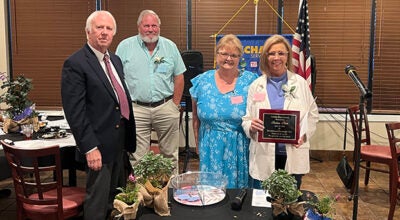Aldermen OK liquor ordinance
Published 2:01 pm Wednesday, October 2, 2013
As a result of a majority of citizens’ vote in the election earlier this year, a comprehensive liquor ordinance was approved by the Board of Aldermen Tuesday night and now awaits official approval by the Mississippi Alcohol and Beverage Control Board, before changes to city liquor policy will take effect Nov. 1.
“It’s what the people want. We are just following through with their wishes tonight,” said City Attorney Joe Fernald who presented the ordinance to the board Tuesday night. The ordinance passed unanimously.
Now the ordinance, and the specific petition for hours of alcohol sales, will be in the hands of the Mississippi ABC board, which oversees liquor laws in the state. The mayor and board of aldermen are expected to hear back from the ABC board before Nov. 2, when the law will most likely go into effect.
The actual process dates back to June 4, to the results of the municipal election, where Brookhaven citizens expressed a desire to allow the sale of liquor in the city. Since then, the board has been shaping the liquor ordinance, in order to mold it into something that is both legally viable and representative of citizens’ wishes.
On Aug. 6, the Board of Aldermen adopted Mississippi Code of 1972, as the legal basis for “the sale of intoxicating liquors within the city of Brookhaven.”
Two weeks later on Aug. 20, the board petitioned specific hours for the sale of liquor in Brookhaven. At this meeting, officials moved to restrict liquor sales between the hours of 10 a.m. to 8 p.m. on Monday through Saturday at “package stores” and from 10 a.m. to 11 p.m. on Monday through Saturday in restaurants. Liquor sales would not be allowed on Sundays.
Since then, Fernald has been drafting the liquor ordinance. With the exception of the restricted local hours of liquor sales, Brookhaven’s ordinance follows the Mississippi law for liquor sales, according to Fernald.
While the specific effects of the new liquor sales remain to be seen, Fernald said, “One thing we do know is that it will provide a new stream of revenue. We know of businesses that plan of moving here because of the upcoming changes.”
Fernald said the next item on the agenda, as it relates to alcohol, will concern a revision of the city of Brookhaven’s beer ordinance. Written in 1964, Fernald said the ordinance is outdated and intentionally drafted in a way that restricts the sale of beer on city property.
“This is something that the board agrees on. We have needed a more modern, sensible ordinance on the sale of beer in the city for some time now,” said Fernald.
In other city business, Brookhaven Police Chief Bobby Bell requested the board allocate funds for an emergency telecommunication training course for three dispatchers at a cost of $1,185. The training course will take place in Hazlehurst.
Chief Bell also requested that current Sgt. David Johnson be made a lieutenant. Bell issued high praise of Johnson, saying he “is the person to go to when I’m not around.”
Bell also requested that current Lt. Clint Earls be designated as a detective, with no change in pay.
Finally, Chief Bell requested that former juvenile officer, Louis Calcote be promoted to sergeant.
The board approved all requests from the chief.
Kay Burton, marketing director for the Brookhaven-Lincoln County Chamber of Commerce, and Entergy Customer Accounts Manager Kenny Goza presented the board with information on the Mississippi Scholars Program, an organization that helps Lincoln county high school students increase their odds of getting into college and achieving high academic success.
Since 2006, the program has helped 1,124 students, and offered more than $635,000 dollars in scholarship funds, according to Goza.
“Universities in Mississippi have told us that they have had a high degree of success with students that are part of this program,” said Goza.
Besides raising the ACT score of students, and helping to provide them the financial resources to make it to college, Burton said, “there are a lot of indirect benefits to the program for students as well, such as interest in community involvement and service.”





